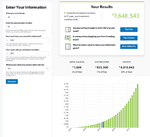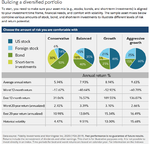So I saw this article that said you should have double your salary saved by the time you're 35, triple by like 40 or 45 etc.. not taking into account my wife's salary, as she'll have a pension, I don't even have my own 1x salary in my TIAA.
Now that we have refinanced and my student loans are done, i kicked up my 401k contribution a point (still only 8%, but after annual raise will go to 10%)
Does anyone else find this unattainable, or at least very difficult?
Rules of thumbs are good for starting points and antacid sales. Much of what follows is not novel.
I think it's more effective to build a model of your income requirements (What do I want to do in retirement? What will those expenses be - how much will I need?) rather than make a rough estimate based on pre-retirement income. To produce that much income staring in year X, how much do I need to save starting now? Can I save more and retire sooner, or can I work longer, realizing that many people do not get to choose their retirement dates? I know some people who are very comfortable living on 40% of their pre-retirement income, and others who are freaking out because they feel 120% of pre-retirement income isn't enough. Both groups are right for them. I might add this approach was critical in my wife's decision to retire when she wanted to.
Be sure to acount for the value of a pension if you a trying to figure out how much you've accumulated for retirement.. I take my wife's pension, multiply that by 25 (4% withdrawal rate) and tell her that's how much we would have to have invested to generate that much income in retirement. For example, a $20k pension is like having $500k in a retirement account, because it would throw off about $20k. One concern about pensions is the stability and security of your pension plan(s).
In March, 2009, I had 0.33x of my salary in my retirement accounts, and I was 53. Today, I have 4.7x of my [much bigger] salary and with my wife's pension and two small ones I accumulated, we will be good in retirement. I basically maxed out my contributions in a high proportion (80-90)%) of low cost index equity funds in my 401(k) and rolled them to my IRA so that I had a lot more choices and eventually management by my advisor. But it was a decade of belt tightening and we still have some work to do on the balance sheet: until a few years ago, I prioritized building my retirement accounts over retiring debt. Now I've reversed those priorities. Had I started getting serious when I was 40, there is no doubt I'd be retired today with more money than I have today. I would also tell 40 year old me to hire a good advisor. He has more than earned his fee, from savings, guidance, and growth. Not to mention less effort and stress on my part.
Time is your friend if you are under 40. You are doing the right thing by boosting your savings rate to get to the max allowable contribution as soon as you can. You won't miss it doing it the way you are doing it.
One minor point I've made before and will repeat here: if you are making the max contribution in a year AND your company matches a portion of your contribution, time your contribution so that you hit your max in the last pay period of the year. This not only maximizes dollar cost averaging, but also ensures your company will be matching the most dollars possible. Here's an easy math extreme example:
You make $130k.yr, paid bi weekly - $5k/paycheck
Company matches first 5% you contribute - $300/pay
Your max allowable contribution is $26,000/yr
If you contribute $1,000/pay, you max out in 26 pay periods. Company matches $300 x 26 pay periods = $7.800 total company match
If you contribute $2,000/pay, you max out in 13 pay periods. Company matches $300 x 13 pay periods = $3,900 total company match













